- Home
- Darcy Pattison
Sleepers (The Blue Planets World series Book 1) Page 9
Sleepers (The Blue Planets World series Book 1) Read online
Page 9
Jake looked at him blankly.
“Oh,” the Captain looked away and shrugged. “It’s just an Earth saying. Be it ever so humble, there’s no place like home. This is my apartment.”
Walking in, the Captain’s windowless rooms were small by Risonian or Earth standards. But Jake would have a room of his own for privacy, something he knew was a luxury on the Moon. It was barely more than a closet, but still, it was his. He’d hoped for windows so he could watch Earth—the other blue marble—but none of the crew quarters had windows. The Peary Crater was situated high enough above the surface that it was always in the sunlight, with no dark times that would create extremely frigid temperatures. Instead, it was a balmy minus 50 Celsius year-round. The disadvantage was that constant sunlight created havoc on human’s biorhythms; in order to create sleep cycles of day and night, crew quarters had no windows and operated on artificial lighting timed to Greenwich Mean Time on Earth.
Jake had to settle for an occasional visit to the observation gallery to look at Earth.
Though the enlisted men ate all meals in the cafeteria, Captain Rose’s cabin had a tiny galley kitchen, a wall of shiny metal. Captain Rose opened two cabinets to reveal boxes of food and told Jake, “Eat what you want. Make yourself at home.”
Jake nodded at the third cabinet with a questioning eye.
Captain Rose looked embarrassed, but opened it and said, “My collection.”
On the narrow shelves sat rows of umjaadi globes. It was a Rison tradition of small globes full of water and aquatic species that could live in an enclosed space like that. They were named after the umjaadi starfish, the most common animal in such an enclosure. Often an umjaadi starfish could live in a globe for two or three years; after they died, it was still a fascinating bit of Rison. So—Commander Rose was a sentimental man.
These globes sparkled in the artificial light. Jake wanted to look closer, but his father shut the cabinet with a sharp click and asked, “Hungry?”
Captain Rose fixed sandwiches—dry smoked meat between two pieces of bread—and they sat at a small table and stared at each other and chewed.
Finally, Jake set down the remains of the sandwich. “I’m done. Thank you, sir.”
“About that. You’re right to call me, ‘sir.’ It’s a sign of respect, and you should use that term for everyone you meet. But you’ll need to call me something else. You can use the Earth term, ‘Dad.’ Or, you can just call me by my first name, Blake.”
Jake brushed his hand over his pants leg, taking comfort in the feel of the green blade strapped to his thigh, and a smaller one on his back. As Swann had promised, the Earthling’s security hadn’t detected it because the carbon blades didn’t set off the metal detectors. He was glad that this man was so direct and just laid out this tricky bit of Earth etiquette so clearly. “Thank you, sir, for explaining that. I’d prefer Blake.”
Blake nodded, leaned back, arms stretched across the back of his chair. “Want to play basketball? I’m off duty the rest of the day.”
Jake shrugged. He knew the term “basketball,” of course, and had actually watched videos of the sport a couple times. But it made no sense. Why did Earthlings play so many games with balls of every shape, size and color? “Why would I want to?” he asked.
Blake nodded decisively. “Of course. Good question. Come. We’ll shoot hoops, and I’ll try to answer that question.”
Blake handed him a set of clothing and motioned for Jake to go to his room and change. Donning the sweat pants, t-shirt and strange shoes that Blake handed him, Jake felt like he was playing dress up. He took a few extra minutes to open his strongbox and make sure that his mementos from Rison were safe: he’d only brought a few things. Knives, of course. A couple things from his long-gone best friend, Stefan Dolk, who had died last year. Several memory devices full of photos and videos of other friends. Sentimental things. He put the strongbox on the bottom shelf of his closet. He might not look at it often, but it was comforting to have something from Rison here on the Earth’s Moon. So—was he a sentimental person like his biological father? Jake closed the door firmly and went out.
Blake was waiting for him wearing shorts. Jake realized that his own pants were part of the price he’d have to pay for coming to Earth. To hide his identity, he could never wear shorts lest let people see his Velcro-legs.
A few minutes later, they strode through another confusing maze of corridors. Walking to the gym beside Blake, Jake felt even stranger. He was on Earth’s Obama Moon Base, walking through sterile white pressurized corridors to a common room that was used to play some game with a ball. Play. It was wrong on so many levels.
Blake handed him a brown ball and showed him how to bounce it up and down. After a few bounces, Jake watched his father—was this stranger really his father?—heave the ball toward a metal circle. When the ball went through the circle—hoop, Blake called it—Blake called, “Three points!”
Retrieving the ball, Blake threw it to Jake, saying, “You try it.”
Jake caught the ball, but just stood and asked defiantly, “Why would I want to?” He was a Quad-de. What was he doing here?
Blake held out his hands, and Jake threw the ball back to him. Blake shot again. The ball rolled around and around the metal circle before falling through and bouncing away to ricochet off the wall. Blake chased it down and turned back to Jake, who hadn’t moved.
“OK,” Blake sighed. “You want answers. But it’s not easy.” He bounced the ball up and down rhythmically, the noise echoing in the chamber. “Dayexi tells me you’re pretty good at hand-to-hand combat.”
Jake shrugged, torn between bragging and not speaking. The Quad-des were always good at fighting. What did Blake expect?
Blake nodded. “OK. I know you’ve taken the top honor for your age group for the last three years. Yes?”
“Yes.” At home, his knife rack had held the specially made trophy knives for the last three years. Reluctantly, he’d left them, of course, no room for vanity in his hasty evacuation. He remembered Swann coming into his room to say goodbye and running a hand across the collection, tears in his eyes, and a bit of pride in his crooked smile.
“On Earth, our teenagers don’t do hand-to-hand combat,” Blake said.
“But you have wrestling.”
“Yes, but it’s a sport, like basketball. It’s not combat like you have on Rison.” Still, Blake thumped the ball up and down, the motion automatic. “Do you know what testosterone is?”
Jake shook his head.
“You’re what? Eleven years old? You’re about to hit your teenage years, which means your life will be ruled by testosterone for the next decade. Testosterone is the human male hormone, and you’ll likely get your share of it. It’s what makes males more aggressive than females. Teenage boys need some way to be aggressive, and in centuries past, they might have gone to war or fought or done a number of things to channel the aggression in ways that helped society. But then, Earth became more civilized. We decided that hand-to-hand combat was too harsh, too cruel, too—well, uncivilized.”
Jake’s anger flared. Hand-to-hand combat was the most civilized, fair, and just method of physical exercise. The Tizzalurian traditions went back for centuries. Furthermore—but Blake was still speaking.
“But that didn’t stop young men from needing an outlet for their aggression. They still needed some way to, well, hit someone, to shove, to fight. Teenage males need socially acceptable ways to be aggressive.”
Jake nodded slowly, letting his anger ebb away in an effort to understand. When he stepped onto the fight floor, there was a certain wild pleasure in knowing that he could let himself go and just fight. And that feeling had grown stronger this last year. If Earth teens were denied hand-to-hand combat, they needed something to replace it.
Blake continued, “Rison has codified the hand-to-hand combat, created rules about it, and structures that award praise to the most aggressive and most skilled. On Earth, we created sports that serve t
he same function. Our young men play football, soccer, basketball, volleyball, golf, and so on as a substitute for battle. Instead of sending them to war, we put them on a basketball court. We tolerate—no, we expect—a certain amount of violence: shoving, tripping, hitting. Within limits, of course. If they went off to battle, we’d expect a certain number of injuries; and we get that on the sports fields. Broken legs, bloody noses, concussions—no one demands that we stop the sports simply because there are a few injuries. We accept those injuries as battle wounds; they are the price our society pays for being civilized and allowing young men to be aggressive only on the sports fields.
“When you step foot on Earth, you must understand that hand-to-hand combat will not be tolerated. That means you need another outlet for your anger, your aggression, your need to be physical.”
Jake stared at Blake with a growing respect. This was a clearer and straighter explanation of Earth sports than he’d ever heard. It actually gave him a clear decision, to either join Earth’s sports or to totally control his own aggression. “This is clearly understood on Earth?”
Blake gave a short laugh. “Oh, no. It’s poorly understood on Earth. It’s just my conclusion.” He stopped bouncing the ball—dribbling, he called it—and threw the ball to Jake.
“On Earth,” Blake said, “we roughly separate the sports by body types. If you’re big and heavy, you play football; if you’re tall and skinny, you play basketball. For those who are tall and skinny, but not very coordinated, they do sculling, which is a sport where they row long, skinny boats. For short and fast players, there’s soccer. For stocky kids, there are things like bowling or golf or tennis or baseball.”
Jake hefted the brown basketball, and let his hands pass it back and forth, feeling its weight. “So many sports!”
“Something for everyone. You’re going to be tall, like me, so basketball is a logical sport to try. Doesn’t matter where you come from, or who your parents are. On Earth, males need some way to be aggressive in a socially acceptable way.”
Jake mimicked Blake and leapt upward; at the top of his leap, he awkwardly shoved the ball toward the hoop. It went through! Complete luck! And yet, elation shot through him. Blake’s insights were perhaps unusual for an Earthling, but exactly what Jake needed. To succeed in passing himself off as an Earthling, he needed wise advisors. Maybe if he thought of Blake as his Earth-culture tutor, instead of his father, it would be enough at first. It had taken time to learn to respect and love Master Bru Paniego, the southern fight tutor who had been so different from Tizzalurian norms. Smiling, he looked up at Blake.
Blake grinned back and nodded.
“What about the females?” Jake asked. “Do they play these sports, too?”
“Sure. And some of them do it to get rid of excess aggression. But they lack the testosterone. Sometimes they play sports to learn to be more assertive.” Blake’s grin widened. “Boys are aggressive; girls are assertive.”
Jake groaned. Yet another Earth puzzle, girls.
Suddenly, though, this whole thing didn’t seem so overwhelming. He tilted his head and looked at Navy Captain Blake Rose. This man had figured out how to combine Risonian and Earthling DNA in a test tube, had implanted the embryo in Dayexi, and had kept track of Jake—his test-tube son—through the years. Blake thought differently than most Earthlings. This discussion, Jake realized, would’ve been very different from a man who didn’t try to think and to evaluate the culture around him. In that regard, Blake was very much like Swann. Both were intelligent leaders who gave Jake a rich heritage. He could never replace Swann but maybe Blake could help Jake navigate through the next few years and help him become comfortable with the Earthling culture.
Jake ran after the brown ball and picked it up. It was a brown globe, like the Moon, no water. Before Jake went down to the blue planet they called Earth, he had a lot to learn.
He threw the ball to Blake and said earnestly, “Teach me how to shoot.”
In the end, Blake and Jake didn’t fish on Saturday morning; instead, they kayaked out of Eagle Harbor, on the eastern shore of Bainbridge Island. Jake had never been in a boat like a kayak before. Long and narrow, it reminded him of a kvakki, a Risonian fish that only swam in the northern seas and fed on Risonian’s version of plankton.
“Do you want to learn to kayak easily, or do you want to fish?” Dad asked.
“Kayak,” Jake answered. The fishing would come after he mastered the boat.
So they left the fishing gear in the car. Dad wore an old Navy wetsuit, but Jake didn’t need protection from the cold water. From his old collection of baseball caps, Dad had pulled out a worn brown and yellow hat, and with a raised eyebrow, handed it to Jake.
Hesitantly, Jake said, “San Diego.”
Dad grinned. “That’s my boy. 1978 San Diego Padres.”
Jake put on the cap-of-the-day, silently glad that Dad hadn’t noticed the NYPD cap was missing.
The morning was cold with wispy tendrils of fog rising. The harbor glistened like a mirror, reflecting the waning stars and the forest of masts from the sailboats docked at the marina. From somewhere onshore, Jake smelled coffee and bacon. But no one else was out on the water.
Dad slipped into his blue kayak first and paddled out a few strokes, turning expertly to watch Jake.
Jake’s stomach felt suddenly empty. He bent and awkwardly put one foot into the red kayak. It rocked and swayed. Lips pressed together, he put his other foot in and awkwardly slipped his feet forward until he was seated. Now, the kayak was stuck on shore, so he grabbed the paddle and shoved at the ground while hitching forward and—suddenly, the lightweight boat was floating on the water.
Heart hammering, Jake dipped the paddle into the water and pulled hard. The boat swung in an awkward circle so fast that only Jake’s sense of balance kept him from going over.
“Use both ends of the paddle,” Dad called, and then demonstrated, dipping the right side into the water and then the left.
The movement of the paddles was like a figure-8, Jake realized. He readjusted his grip toward the middle of the paddle and tried again. The kayak went skimming across the water. Instead of following his father toward open water, though, he veered right, out of control, toward the inner harbor. Slowly he realized that he was favoring his left arm, pulling too strong on that side. But still, he couldn’t settle into a rhythm.
He longed to dive into the water, to swim. That was the problem. To be on an island, surrounded by water, was torture. When Dad had been a boy on this island, the story went that Sir hated it when Dad wanted to stay inside. “Go play outside,” Sir ordered.
While on the Moon, Dad had joked. “You’re on the computer too much. You’re with me too much. I wish I could tell you to go outside and play.” But of course, Jake couldn’t go outside the domed Moon Base.
Swann had done the same thing. “You can’t stay in your room to play video games. Go play in the water.”
Now, Jake’s orders were always, “Stay out of the water.”
If he mastered this kayak, he could at least be on top of the water, closer than anything he’d done since Gulf Shores. He’d be the best kayaker on Bainbridge Island. And if, now and then, he happened to upset his boat and fall into the water—well, accidents happened. Accidents might happen often, he thought, with a grim smile.
That decided, he settled into the rhythm of padding and controlling the flimsy boat. Dad paddled leisurely toward the harbor opening, letting Jake fight his own battle with the kayak. By the time they came out of the harbor into Puget Sound, they were paddling in unison.
“Where will we go?” Jake said, his voice carrying easily across the still water.
Dad pointed to a rocky island. “If we’re lucky, there’ll be harbor seals on Blakeley Rock.”
Distances were deceptive on the water. They paddled steadily for almost an hour before they drew near to the rock. Indeed, sleek, brown figures dotted the rocks.
Several slipped into the water,
barely ruffling the surface. Jake laid the paddle across his lap and let both hands drag in the water. He shivered with delight at the touch of brackish water. Puget Sound wasn’t as salty as the Gulf of Mexico, but it was still salty. Rubbing his fingers in the water, he felt the difference between the two bodies of water. The Sound was cold enough that humans would need a wetsuit, but it felt balmy to Jake. He’d have to dive two or three hundred feet before the cold affected him.
Jake thought back to his swim with the great shark of the Gulf, the joy of exploring. The hairs on his arm rose, and he longed to plunge into Puget Sound and swim with the harbor seals. How could he stay out of the water?
As if he read Jake’s mind, Dad asked softly, “Have you been swimming?”
“No,” Jake said. Sadness touched him that Dad had to ask, that Dad didn’t trust him. He hesitated, almost ready to tell Dad about the incident in the pool and about Coach Blevins.
But Dad spoke harshly, “Good. Your mom will kill you if anyone finds out who you are.”
Jake’s lips tightened, and he clenched his jaw. He could tell Dad nothing.
A harbor seal swam closer to Jake’s kayak. Jake froze, barely moving, willing the amazing creature to come even closer.
Sleek, brown-freckled fur—it drifted closer.
Its eyes were large, dark pools of black. Softly, it breathed out—Phooo! Phooo! With each breath, its nose closed off completely, like an eyelid opening and closing: underwater, this would keep any water from reaching its lungs. Exactly like the interior nose lids of every Risonian! Jake hadn’t known that any Earth creatures so closely mimicked Risonian anatomy.
Jake slowly leaned over and put his hands into the water. He flapped them, trying to send waves that would say, “Friend.”
The seal wiggled, sending waves back to Jake. Was it trying to repeat the word, “Friend?” He couldn’t be sure. A thrill surged through him because another Earthling sea creature had come to look at him. It was a good omen: Earth’s oceans would be a good place for Risonians.

 When Kittens Go Viral
When Kittens Go Viral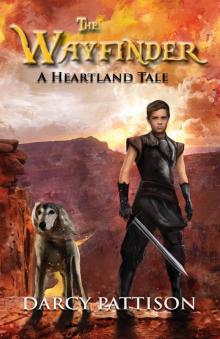 The Wayfinder
The Wayfinder Sirens
Sirens The Girl, the Gypsy & the Gargoyle
The Girl, the Gypsy & the Gargoyle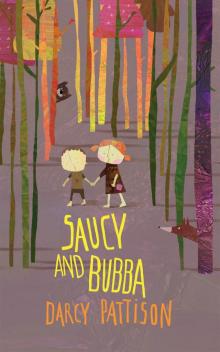 Saucy and Bubba
Saucy and Bubba Longing for Normal
Longing for Normal Kell, the Alien
Kell, the Alien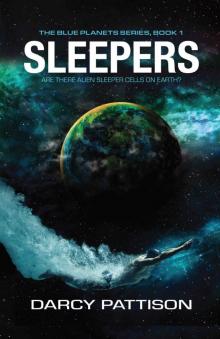 Sleepers
Sleepers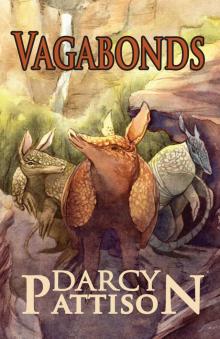 Vagabonds
Vagabonds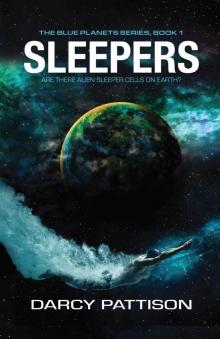 Sleepers (The Blue Planets World series Book 1)
Sleepers (The Blue Planets World series Book 1) Pilgrims (The Blue Planets World series Book 3)
Pilgrims (The Blue Planets World series Book 3) Pilgrims
Pilgrims Kell and the Horse Apple Parade
Kell and the Horse Apple Parade Sirens (The Blue Planets World series Book 2)
Sirens (The Blue Planets World series Book 2)